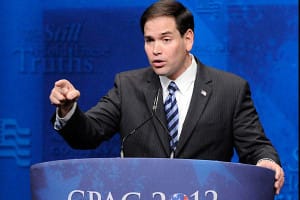
Presidential Primary Book Club: Marco Rubio
 Concerned citizens bear many great burdens, one of which is trying to follow a presidential race in which virtually every candidate has written one or more books about their lives, hopes, dreams, theories — and, in the case of Mike Huckabee, diets.
Concerned citizens bear many great burdens, one of which is trying to follow a presidential race in which virtually every candidate has written one or more books about their lives, hopes, dreams, theories — and, in the case of Mike Huckabee, diets.
You cannot possibly read them all. It is very likely you don’t want to read any. That’s what we are here for. Today: Marco Rubio.
Rubio is 43, and he has already written an autobiography (“An American Son”) and a book on policy (“American Dreams”). Do not feel compelled to go back and look at “100 Innovative Ideas for Florida’s Future.”
Right now, we’re going to concentrate on the autobiography, which is a great corrective for anyone under the impression that Rubio had an impoverished childhood. His parents, working-class Cuban immigrants, most definitely did struggle financially. But Rubio makes it clear none of the struggling trickled down to him: he lived a “charmed, happy life” and was, in fact, “an insufferably demanding kid.”
Kudos for candor, Marco Rubio!
He certainly did have a talent for getting his way. Rubio’s family were Mormon converts, but, when Marco was about 12, he argued that everyone should go back to Catholicism. Which they did. He then requested that he and his sister be allowed to go to Catholic school, and his parents agreed, even though it was a financial stretch. Marco soon decided he didn’t like it, and successfully demanded a transfer to the local public school.
Besides his extremely cooperative relatives, the most vivid characters in the book are probably the Miami Dolphins, who come up all the time. Although his sister and fiancée won positions as cheerleaders, Rubio’s own hopes of making the team were quashed by reality. But not before he tried to pursue the dream by accepting a football scholarship to a 500-student private college in Missouri that was more than a two-hours’ drive from Kansas City and flirting with bankruptcy.
Somewhere during freshman year, he seems to have gotten a grip, and it was back to Florida, community college and then upward and onward through law school. At this point, with his early flaws corrected, Rubio starts confessing that he was a bad boyfriend to his future wife, Jeanette, and later, an absentee father as his political career took off.
But all of Rubio’s faults, it turns out, are personal. Politically, he has no regrets. He manages to go from a youthful labor union enthusiast to Tea Party poster boy without any hint of internal struggle. And while the book is jammed with details about polls and campaign staff shake-ups and fund-raising, it’s often weirdly apolitical. The first time Rubio says he felt “a genuine desire to engage in federal policy debates” was in 2008 when Barack Obama was elected president, and he was already a former speaker of the Florida House of Representatives.
Rubio was elected to the State Legislature at 28, and he made it to speaker in six years. (Florida has eight-year term limits, so there’s actually no such thing as a slow, steady climb to power.) When he arrived, the governor was Jeb Bush, who Rubio describes as pretty much the best person in the universe. Later, when he was considering a race for an open Senate seat, Rubio dutifully checked first to see if Jeb was interested. “If he were to run, no one would challenge him in the primary — certainly not me,” he wrote. Ah, history.
Rubio clashed with Bush’s successor, Charlie Crist, over Rubio’s idea — the first of those we’re really hearing about — for eliminating all property taxes in favor of higher sales taxes. It was an early harbinger of Rubio’s antipathy for taxation according to the ability to pay, but Crist successfully countered with a much more modest proposal.
Their other big battle involved Crist’s ambitious efforts to fight global warming. Rubio’s discussion of this entire issue takes up two paragraphs, and despite the fact that Florida is absolutely awash in the effects of climate change, it’s the only mention of the subject in his autobiography. Also — spoiler alert — it’s not going to come up at all in his policy book.
Meanwhile, that Senate race is looming. Crist is running, too, and the first part of Rubio’s campaign seems to mainly consist of whining. (“Why would God put me in this position?”) God figures a lot in this story, and although Rubio says he knows “God didn’t endorse candidates,” he does make it pretty clear that he knows who would win if God had an absentee ballot.
Triumph! Marco Rubio is off to the Senate in 2011. His career there takes up only five pages. “What has surprised me the most,” he confides to readers who have stayed with him until the bitter end, “is that life as a U.S. senator is pretty much what I expected it to be.”
Go, Dolphins.
